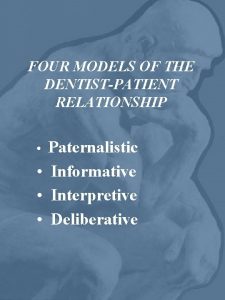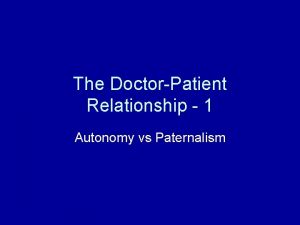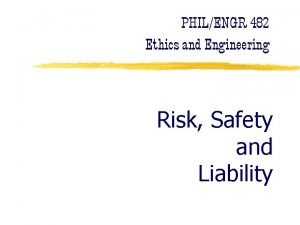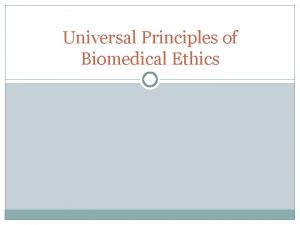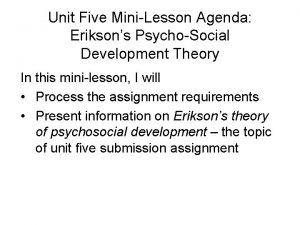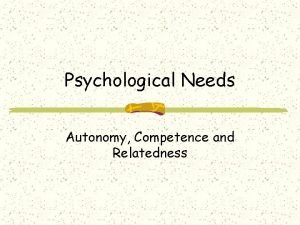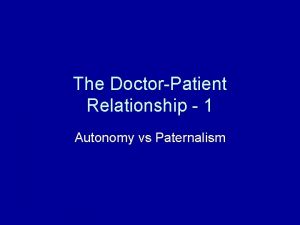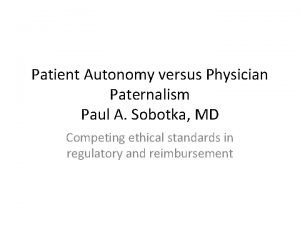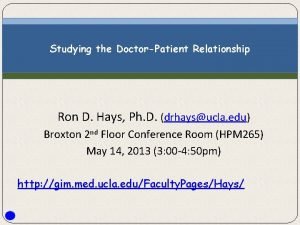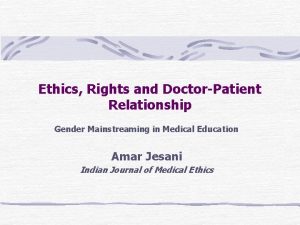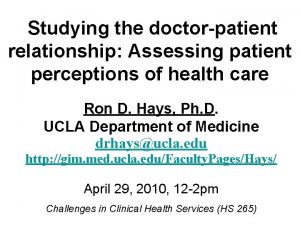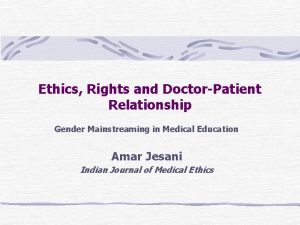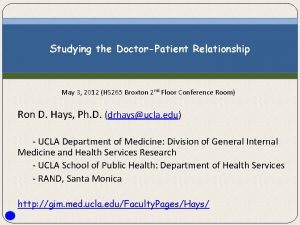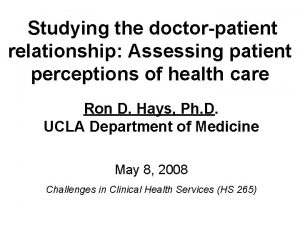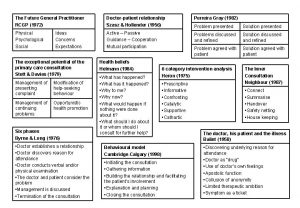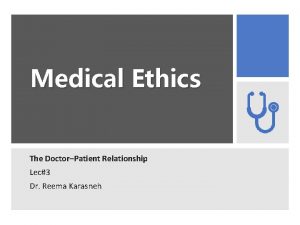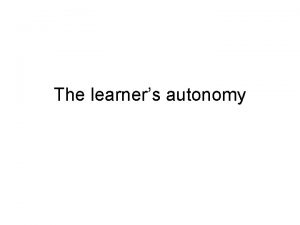The DoctorPatient Relationship 1 Autonomy vs Paternalism Main



































- Slides: 35

The Doctor-Patient Relationship - 1 Autonomy vs Paternalism

Main Theoretical Positions • Consequentialist – Morality of act depends entirely on results – Also called “utilitarianism” – Cost-benefit analysis and risk-benefit analysis are applied forms • Kantian – – Opposite of consequentialism: results irrelevant Ethics based on absolute rules and rights Kant: treat people as ends, not mere means Influential in issues of informed consent

Issue of Autonomy • Caregivers sometimes confront conflict between two obligations – Do what is best for your patient – Respect wishes of competent patient. • AUTONOMY: the claim of persons to make decisions or have their choices respected when primarily their own interests are at stake

Theories Applied to Autonomy Consequentialist Respect patient’s choice if and only if it leads to the best resuls Kantian: absolute rules or rights Always respect informed choice of competent patient This implies obligation to provide the necessary information or to do what is needed to restore capacity for autonomy, if possible

Prima facie (non absolute) Rules and Rights • • • Associated with W. D. Ross (Munson will refer to Ross’s theory of prima facie duties) There exist rules (e. g. , “respect autonomy”) independent of consequences. These rules, however, are not absolute rules (unlike Kant). A rule may be outweighed by other more important rules or by overwhelming consequences. Still not consequentialist: mere fact that better consequences result from breaking rule does not make it okay to break. • Question: when do consequences outweigh rules and when do rules outweigh consequences? • • Ross: “use your best moral intuition” Big issue: what role for intuition: “principle-based ethics versus intuition. • Some argue against the whole idea of principle-based ethics. What alternative? Narrative ethics, virtue ethics. Consequentialism and Kantianism are both forms of “principle-based ethics. ” Ross’s theory of “prima facie duties” is also principle-based but adds an element of intuition.

Consequentialism and Nonconsequentialism Consequentialism The only thing that determines the morality of an action are its results (consequences) Consequences are not the only thing to consider Consequences one of several things to consider Consequences are irrelevant to the morality of an act Prima facie rules or prima facie rights Absolute rules or rights. (Non-absolute rules or rights) Kantian ethics

Prima Facie Rules/Rights applied to accepting patient choice • A prima facie right to have choice accepted and a prima facie duty of physicians? • What could outweigh patient choice? – Disastrous consequences? – “Interests of the state in life (some legal decisions) – Interests and needs of family? – Contrary to the purpose and goals of medical profession” • What are these? • Can a patient request clearly conflict?

Dax Case • If you as physician judge treatment would benefit Dax, what ethical principle would justify ignoring his wishes? • Is it a justified principle? • Must autonomy always mean respecting current wish of patient? • Might one ever respect autonomy by looking to patient’s genuine choice, not his/her current one? • Might there be retroactive consent from the patient’s genuine self?

Dax Case • Central ethical question: when, if ever, is it morally appropriate to perform lifesustaining treatment against a patient’s wishes?

Which Changes Would be Relevant? • Dax’s competence questionable • Prognosis much clearer in one direction or another • Pain could be relieved • Mother agrees with Dax? Father (or spouse) alive and agreeing/disagreeing? • What should be role of family with an adult, competent patient?

Dax’s Case Mrs. Cowart – Dax’s mother • What principles and values was she using to guide her decision making? • Is she acting as an appropriate surrogate decision maker for Dax?

Ask Yourself. . . How would you want your surrogate to make health care decisions for you? On what basis? Using what information?

Legal Standards for Surrogate Decision Making • Best Interests: – Doing what is in the person’s best interests when no previous expressions have been made. • Substituted Judgment: – Making the choice the incapacitated person would make if he/she was able; acting on knowledge of what that person would wish to have.

Competence as an Ethical Issue • Not a simple factual determination (although law looks at it that way) • Two ethical obligations – Respect autonomy of patients able to exercise it. – Protect vulnerable patients from self-destructive choices • Where on this continuum should social policy be?

Models of the Physician Role • Priestly – Doctor makes the decisions Paternalism – Patient “follows doctor’s orders” • Guidance-cooperation • Collegial • Engineering – Doctors offers the medical facts – Patient makes the decision Autonomy

Each Appropriate in Different Situations • Priestly – Emergencies – Patient wishes doctor to make all decisions? • Engineering ever appropriate? • Which currently practiced? • Which is ideal to strive for?

Famous “ 4 Principles” • Beneficence • Nonmaleficence (“first, do no harm”) • Autonomy • Justice Beauchamp and Childress, Principles of Biomedical Ethics

Autonomy • Refusal of recommended treatment • Request for treatment not recommended? • Informed consent to treatment • Truthful and reasonably complete information – Needed for consent or refusal and for information itself. – One reason for coming to doctor is for information itself. (“Is this serious? ”)

Medical Paternalism • Restricting patient’s freedom for patient’s own good. (“Doctor knows best”) • Can be “weak” (to prevent harm) or “strong” (to benefit) • Can be in clinical practice or in policy/law – Is there enough FDA regulation of supplements? • Can be pure or mixed • Core ethical question: when, if ever, is medical paternalism justified?

What ethical arguments for autonomy? • Promotes trust • Leads to greater cooperation from patient • Terminal patient can make critical decisions • Other patients will trust when you say condition is not serious • Patients might not even come for treatment if they feared losing control over decisions. • Doctors don’t know patients well enough to know what is good for them.

Consequentialist Arguments for Autonomy • Promotes trust • Leads to greater cooperation from patient • Terminal patient can make critical decisions • Other patients will trust when you say condition is not serious • Patients might not even come for treatment if they feared losing control over decisions. • Doctors don’t know patients well enough to know what is good for them.

What if Consequences Better by Denying Autonomy? • Is there a right to autonomy? • Is respecting autonomy basic to respecting a person as a freely choosing being?

Argument for Paternalism • Often consequentialist: prevents harm or benefits patient more. • “Contract” argument: by coming to a physician one is accepting medical expertise. • Alternative view: one is only accepting that health is one of one’s values. Maybe it is outweighed by others.

What Is Informed Consent? • Ethically, the obligation to respect patient autonomy. • Often focuses on legal requirement for assent to a particular procedure • Argument: should discuss long-scenarios, if relevant. • Should we strategize about “least worst death? Margaret Battin

Informed Consent as Process • Not just disclosing information but being sure it is understood? How? • In the law, discussion of – Professional practice standard – Reasonable person standard – Should we move to individualized standard?

Individualizing Informed Consent • How do we know how much patient wants to know? • Is transparency model on the right track? • Could it serve as legal standard? • Should patients who want more information have to pay more?

Challenges for Autonomy • Doctor’s mistakes • Complete information about success rate? • Children • Alternative medicine • Other cultural values

Mistakes What follows are some messages from the MCW Bioethics internet forum (closed; names omitted): As disclosure of iatrogenic errors is often hidden in clinical practice, this also seems to be an area in bio-ethics which I haven't seen widely discussed. And yet there are ethical principles involved when a mistake in medicine occurs. Inherent in the consideration of the ethics involved is understanding that patients often look at their physicians as infallable and at themselves as invulnerable to the complications of medical care. For starters, is it ethical for the physician to disclose to the patient or family *any* error or not to disclose *every* error whether by commission or omission, whether injurious or non-injurious, whether caused directly by the physician or caused by some other member of the health care team or by the system itself? What type of error should ethically be disclosed and which need not be disclosed? What ethical principles would be involved in the decision whether to tell or not to tell? For example, would it be more beneficent to the patient, in terms of preventing unnecessary anxiety, not to tell about a non-injurious error. Where does the physician draw the line in communication of error or is there no line to draw?

Mistakes - 2 You've identified a very important issue, and I agree that it has been virtually ignored by bioethicists. … One guideline that may be helpful in determining the ethical responsibility for disclosure of mistakes is that patients and families have a right to know whatever is likely to influence their decision making. Some mistakes make no difference, or are unlikely to make a difference, in decisions made by patients or family members. Using the analogue of the requirements for informed consent, a detailed account of all of the potential risks for every procedure may not be required in part because one cannot identify all of the possiblities in advance, and reasonable people may not wish to hear about risks that are statistically insignificant or trivial in their implications. They do, however, want to know about significant or non-trivial implications. Admittedly, patients differ with regard to whether the information is pertinent to their decisions, and this necessitates clinical ethical judgments with regard to each situation.

Mistakes - 3 There seems to be a corollary to the above guideline: that one ought to disclose pertinent information not only to patients or family members who ask for it but to those who don't as well. Clearly, some people don't know enough to ask, or may be intimidated about asking; these people have as much right to know about iatrogenic mistakes as those who ask. Dr. Bernstein asks whether disclosure is required only when it results in harm or also even when it doesn't result in harm. The Council's opinion tends to suggest that disclosure is required only when there are consequences for the patient, but the answer depends on your theory for disclosure. If you take a strong deontologic view and argue for honesty and truthtelling by physicians as important values for their own sake, for example, as ways that physicians show respect for their patients, then a broad obligation to disclose would follow, including when there is no actual physical harm to the patients. Even from a more consequentialist perspective, however, I think you can argue for a strong duty to disclose. If it is the case that a physician's error, even when it does not cause harm, is predictive of future error, then the patient would want to know that an error occurred so that can be taken into account when deciding whether to continue therapy with the physician. Of course, this ties us into the debate about physicians' obligations to disclose characteristics about themselves, like alcohol use, that may affect their competence.

Mistakes — A Story Let me tell you all this story. I once injected the patellar bursa of a young man who had bursitis there (this is the pad in front of the knee which is often inflamed by prolonged kneeling on a hard floor). I reached for the depo-medrol (a type of injectable steroid) but came up with depo-progesterone instead (a female hormone). The injection went well, and I wrote my note, and went up to the office. Hours later, I thought about the case. I went back down to clinic and found that I had written a note detailing that I had injected Depo-provera. I resisted the temptation to change the note. I called a urologist, who told me that one injection of provera would have no affect on a man. I worried. Two days later, I called the patient and asked how his bursitis was. "A little better" he said. I told him to come in for another injection if it didn't improve all the way. A week later, he came back. The knee pad was less inflamed, but not completely improved. I injected it, this time with the right medicine, and did not charge him for the second visit. I tried to tell him of the mistake, but the words just wouldn't come out. The knee is all better now. Two years have passed. My mistake is still documented on the chart.

P. S. Should I still tell my patient that I injected him with female hormone?

One Contributor’s Conclusion There are three sorts of reason (not equally strong) to inform your patient of your mistake - for your own sake, for his sake, and for the sake of principle. Your self-regarding reasons include relieving pangs of conscience (a kind of distress) and helping to preserve your capacity to feel such pangs (an integrity concern). You have reasons to tell your patient for his sake. In this case, these reasons do not attach to his welfare interests since you have reasonably established that the mistake caused no harm. Instead, the reasons attach to his interest in having a candid relationship with his physician. Finally, you have reasons of principle, doing the right thing because it is right, independent of the consequences.

Informed Consent How much information? • Include success rate of physician and hospital? • Problems of outcome research

Other issues Children Respect for Other Cultures
 Strong paternalism
Strong paternalism Interpretive model of doctor-patient relationship
Interpretive model of doctor-patient relationship What is deontology
What is deontology Paternalism in dentistry
Paternalism in dentistry Weak paternalism
Weak paternalism Autonomy shame and doubt
Autonomy shame and doubt Ethics beauchamp and childress
Ethics beauchamp and childress Maladaptation of identity vs role confusion
Maladaptation of identity vs role confusion Non maleficence beneficence autonomy justice
Non maleficence beneficence autonomy justice Muscular-anal stage
Muscular-anal stage Self-configurable autonomy mod
Self-configurable autonomy mod Example of relational dialectics theory
Example of relational dialectics theory Themes jane eyre
Themes jane eyre Autonomy collocation
Autonomy collocation Consumer autonomy
Consumer autonomy Developmental crisis
Developmental crisis Issues or problems related to local governance/autonomy
Issues or problems related to local governance/autonomy Generativity stage
Generativity stage Autonomy competence and relatedness
Autonomy competence and relatedness People dying
People dying Propriate functional autonomy
Propriate functional autonomy Autonomy and independence
Autonomy and independence Autonomy versus shame
Autonomy versus shame Advantages and disadvantages of autonomy in png
Advantages and disadvantages of autonomy in png Autonomy non-maleficence beneficence and justice
Autonomy non-maleficence beneficence and justice Beneficence non maleficence justice autonomy adalah
Beneficence non maleficence justice autonomy adalah Morality
Morality Relationship management vs relationship marketing
Relationship management vs relationship marketing Expressing the future
Expressing the future Types of main idea
Types of main idea Void main int main
Void main int main Thế nào là mạng điện lắp đặt kiểu nổi
Thế nào là mạng điện lắp đặt kiểu nổi Tỉ lệ cơ thể trẻ em
Tỉ lệ cơ thể trẻ em Lời thề hippocrates
Lời thề hippocrates Vẽ hình chiếu đứng bằng cạnh của vật thể
Vẽ hình chiếu đứng bằng cạnh của vật thể Quá trình desamine hóa có thể tạo ra
Quá trình desamine hóa có thể tạo ra

